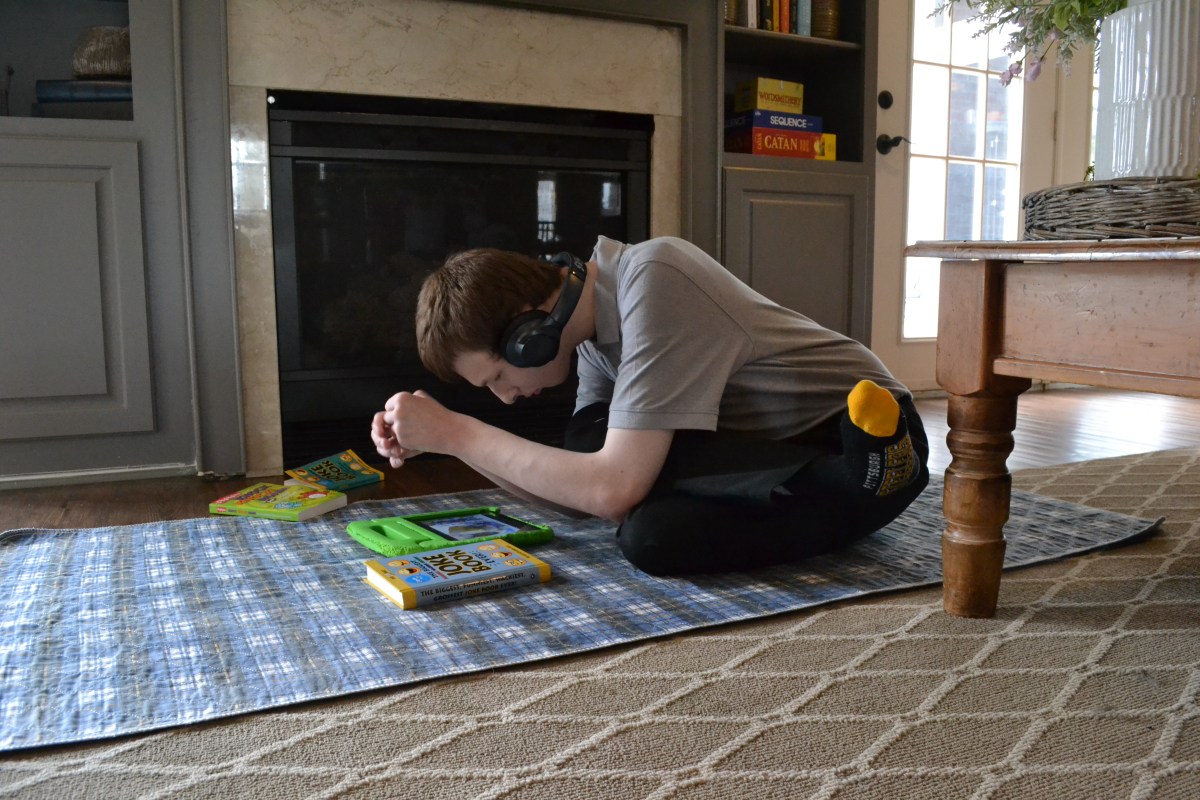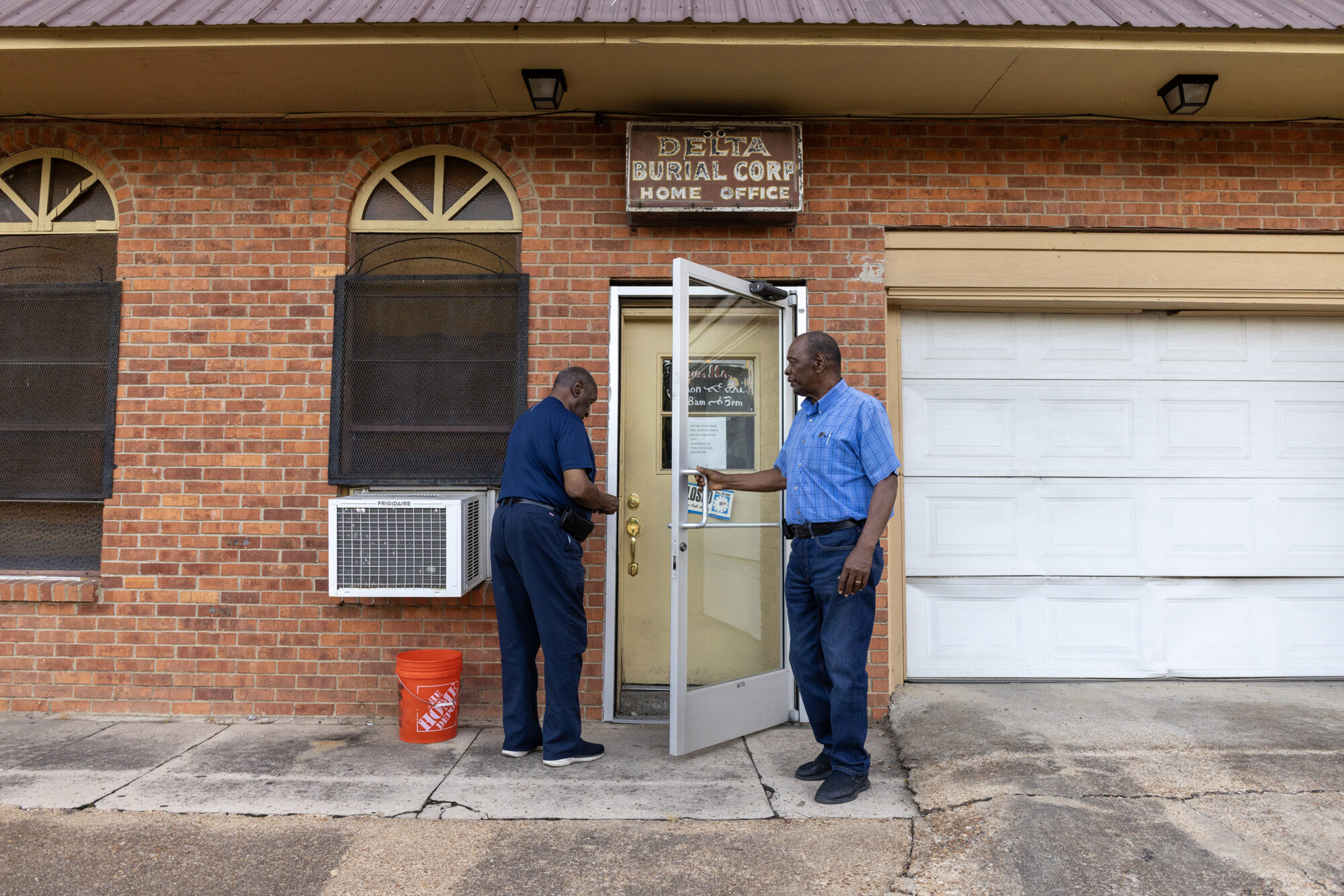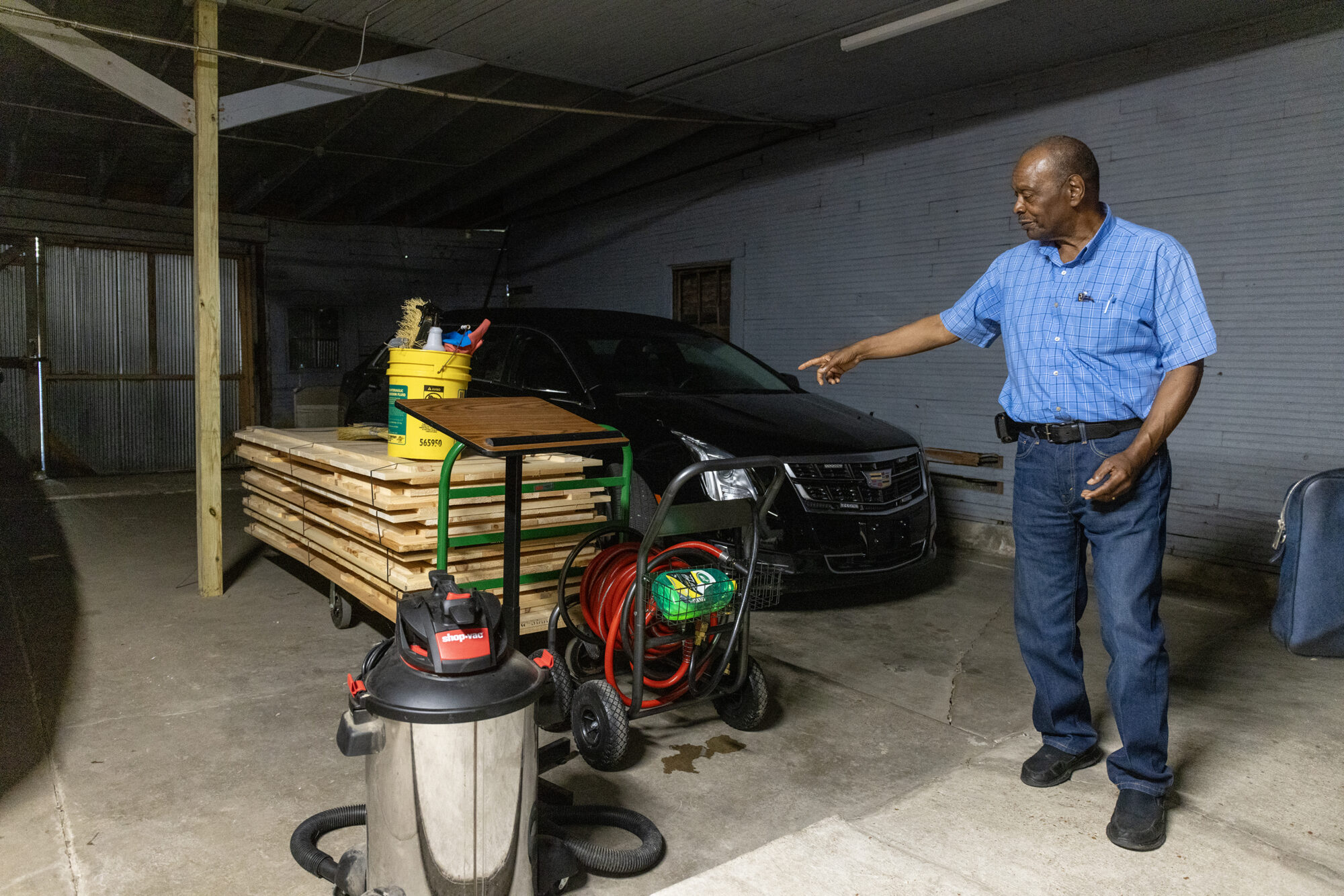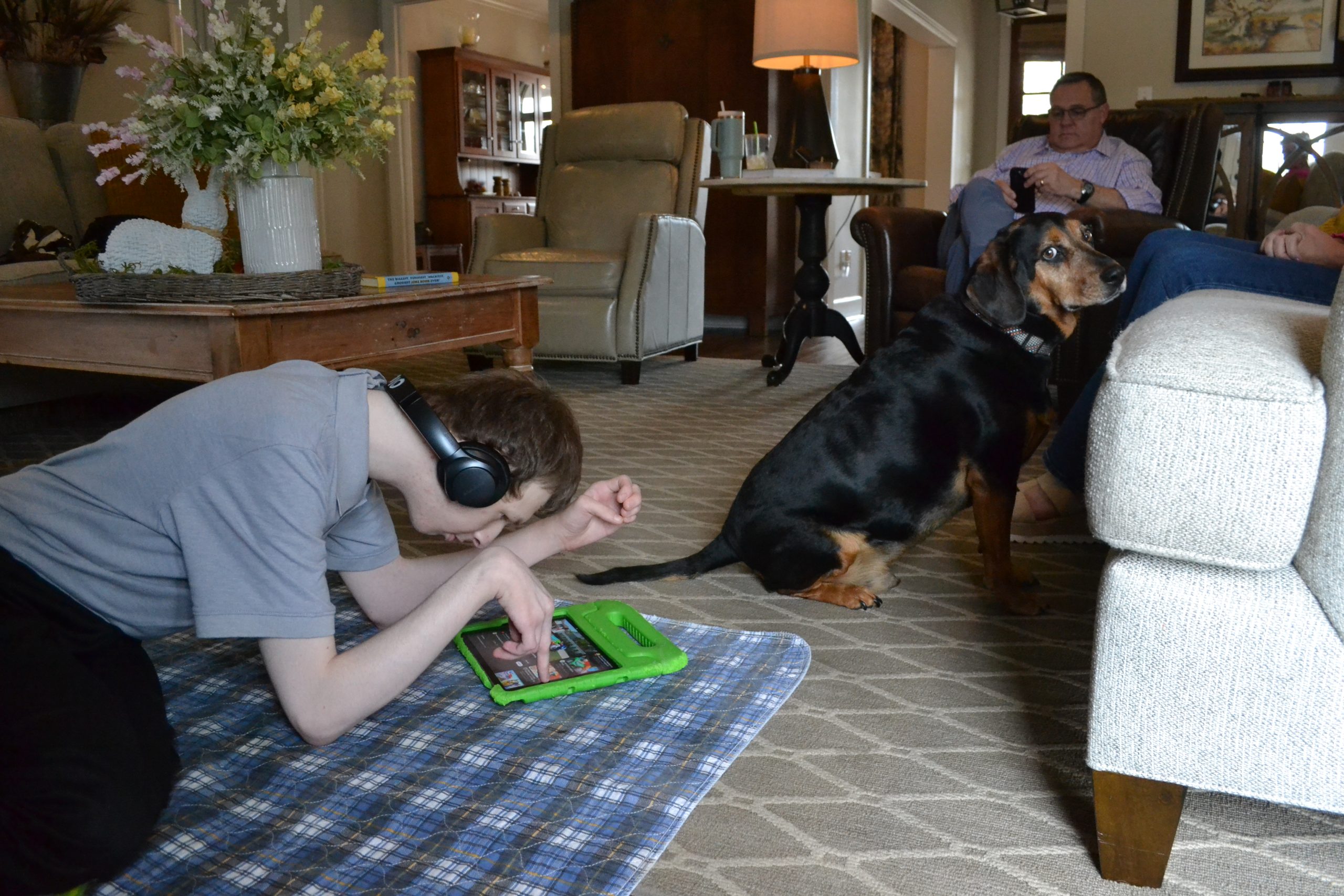Mississippi Today
'You're not in line': Family battles politics, indifference, and suspected fraud in federal health care program
‘You’re not in line’: Family battles politics, indifference, and suspected fraud in federal health care program
Natalie Gunnells had finally secured some assistance from Mississippi’s political class for her 23-year-old son Patrick, who has severe autism.
No sooner had she started receiving relief from the state’s Medicaid agency than her local lawmaker accused her of supporting his political opponent, delivering an ominous warning.
“You’re not in line, you’re not in sync to help you and your family,” said the local senator.
Patrick is one of 2,750 Mississippians on a special Medicaid program that is supposed to provide outpatient services to people with intellectual or developmental disabilities, known as the IDD waiver. The purpose of the waiver — a roughly $125 million-a-year program funded mostly by the federal government but administered by state agencies — is to allow this vulnerable population to live in the community as opposed to an inpatient facility.
But even though he receives the waiver, Patrick has for years lacked a caregiver or specialist.
“I’m telling you this waiver is designed to fail. You don’t fail this many people year, after year, after year if it is not designed to fail,” Natalie Gunnells said at a community meeting in February.
Without the specialized behavioral therapy that he is eligible to receive, Patrick’s potential is unknown. Patrick is nonverbal and cannot perform normal tasks, like using the bathroom on his own. When he was a child, his parents fought for him to receive the special education he was entitled to at the public school. These days, Patrick rarely agrees to leave the family’s Tupelo home, and he’s almost always wearing his large black headphones due to noise sensitivity.
Yet, the Gunnells recently found out that Medicaid has been dishing out thousands for therapy they say Patrick is not receiving under what they believe is a fraud scheme. Documents suggest the alleged abuse was made possible by years of loose oversight at the Department of Mental Health. The state attorney general’s office is currently investigating, according to AG communication obtained by Mississippi Today, though no one has been charged with a crime.
READ MORE: Attorney General investigating provider fraud in Medicaid waiver

Adding insult to injury, when the federal government decided during the pandemic to temporarily allow parents to get paid to deliver care to their disabled adult children, Mississippi chose not to adopt the policy.
Natalie Gunnells and her husband Jamie Gunnells knew they’d have to involve Sen. Chad McMahan, R-Guntown, their local lawmaker, if they wanted a shot at the new benefit.
It was the same way when Patrick got on the waiver, known for its years-long waitlist, more than a decade ago.
“You have to know somebody to get off the waiting list,” said Jamie Gunnells, who owns and runs an independent pharmacy in Tupelo. “It’s pitiful.”
In roughly the last year, Mississippi Division of Medicaid Director Drew Snyder asked one of his division directors to follow up on requests from at least eight sitting lawmakers, all white Republican men, according to text messages obtained by Mississippi Today. The politicians seemed to urge the agency to remove roadblocks for specific beneficiaries who were attempting to access Medicaid.
In each case, Tracy Buchanan, Medicaid’s director of long term services and supports, responded that she was on it.
READ MORE: Texts show lawmaker influence over Mississippi’s Medicaid rolls
McMahan has become particularly known for keenly navigating government red tape to help Mississippians get the public assistance they need. “I am relentless about contacting these agencies on my own,” McMahan told Mississippi Today. “I personally call and take an interest in every one of these cases to help people.”
As part of his stated commitment to help his constituents, McMahan convened a meeting for the Gunnells with Medicaid officials in May of 2022. After it ended, the couple alleged that McMahan casually propositioned them.
“He says, ‘Well, that ought to be worth a $25,000 campaign donation, don’t you think?’” Jamie Gunnells said.

While the Gunnells, who have publicly shared support for various Mississippi politicians, had made contributions to McMahan’s past campaigns, they said they were put off by the request and have not donated to McMahan since.
McMahan adamantly denied making the ask for a campaign donation. “No, I didn’t say anything like that,” he said. “… That’s a terrible thing to say.”
In Mississippi, it’s not uncommon for the state’s Republican leaders, who otherwise revile public assistance programs, to use the system for the benefit of themselves and their political supporters — no better illustrated than within Mississippi’s still-unfolding welfare scandal. One former grant recipient and defendant in the case, Christi Webb, even accused McMahan of delivering a threat on behalf of former Gov. Phil Bryant to withhold grant funding to the nonprofit she ran, Family Resource Center of North Mississippi, because she had supported and hired the wife of a Democratic candidate for governor. McMahan denied the allegation.
McMahan had also been jockeying for funding from Mississippi Department of Human Services, which administers the federal Temporary Assistance to Needy Families (TANF) block grant, to go to the Autism Center of North Mississippi. For a short time years ago, Patrick received services from the autism center, and his parents praised the quality of the program.
Auditors found that the autism center improperly received a $75,000 grant from the welfare agency, as well as more than $300,000 in grants from Family Resource Center.
MDHS employees had expressed hesitation about whether anti-poverty funds could be used to support services for well-to-do families at the autism center, but after a meeting between McMahan, Bryant and the welfare director, grant money flowed to the center anyway.

At the Gunnells’ urging, the Mississippi Division of Medicaid eventually adopted the federal policy allowing parents of severely disabled adults to temporarily become paid caregivers.
Natalie Gunnells, who has a master’s degree in counseling and gave up a promising career in education to care for her son, took courses to become certified through a local personal care provider last year.
Still, Mississippi had chosen the more stringent version of the policy that said legal guardians could not participate. So Natalie Gunnells had to relinquish her guardianship of Patrick — at a price of $2,300 to her attorney — to serve as her son’s taxpayer-funded caregiver. She began receiving the $12-an-hour wage for her work in November. This temporary policy, called Appendix K, only lasts until the end of the public health emergency, currently planned for next month.
In early January, Natalie Gunnells shared what she thought was an innocuous Facebook post from Lauren Smith, a local lab tech consultant and growing social media personality. Smith promotes conservative politics through her Facebook group “P.R.I.M.E” (Patriots for Rights Integrity Morals and Ethics), often taking aim at establishment GOP leaders. She was gearing up to run against McMahan for his Senate seat.
“If you want to know what’s really going on in politics in our great State, then you need to listen to Lauren Smith!” Natalie Gunnells wrote. “Ya’ll, this girl…her passion, knowledge, expertise…JUST LISTEN!”
Then her phone rang.
On the other line, McMahan explained to the Gunnells that “someone in Washington” had alerted him to Natalie Gunnell’s Facebook post, and they weren’t happy.
“There’s some of us out here that are doing everything we can to help your family, and it’s just, it’s just a slap in our face,” McMahan said, according to a recording of the call obtained by Mississippi Today. “… I just want you to know that I may be the face of trying to help you, but there’s a lot of people behind me that’s tried to help you, and y’all are making it difficult for your own cause.”
“We’re making it difficult by liking a post?” Jamie Gunnells said.
“Yes,” McMahan said. “Yes.”
“I don’t understand that,” Jamie said.
“Well, I guess you’ll just have to trust me. I don’t know the pharmaceutical industry, but I know politics. And I guess you’ll just have to trust me,” the lawmaker said, according to the recording.
To the Gunnells, McMahan’s call came off as a veiled threat to withhold help to Patrick.
“That’s terrible. If that’s the impression I left, I’m really, I’m deeply sorry about that,” McMahan told Mississippi Today. “I thought they would deceive my sincerity about how hard I had worked on their behalf, and they know I did.”
But on the call, McMahan also accused his opponent of wanting to end Medicaid — the program that provides not only Patrick’s waiver, but his health insurance. “She (Smith) is against every type of program,” McMahan told the Gunnells. “She would take literally the bread out of your family’s mouth to end any type of government assistance, and you’re supporting her.”
After the interaction, Natalie Gunnells said she felt that the solution they had reached with Medicaid was in jeopardy. She deleted her Facebook post.
“Senator McMahan was referring to a quid pro quo: he was helping us and if we wanted to continue to rely on him and everyone he stated behind him helping, we better not promote Lauren Smith at all,” Natalie Gunnells wrote to Mississippi Today.
McMahan explained his response to the situation, telling Mississippi Today, “It’s a normal reaction when you help somebody and then they’re out there supporting other individuals that are completely opposed to their own need.”
“It is human nature. I mean, come on,” he told Mississippi Today. “You give somebody just hours and hours of help in trying to help their family, and then they’re out there supporting individuals, not just my opponent, but other individuals in general that are against any type of Medicaid enhancements. And it’s just odd.”

The Gunnells are ardent conservatives, backing far-right candidates such as Sen. Chris McDaniel, a Republican candidate for lieutenant governor and tea party populist who’s tried to fracture Mississippi’s establishment GOP since at least his U.S. Senate race in 2014. These candidates are particularly hostile to taxpayer spending on government assistance programs.
But the Gunnells said they don’t believe Smith or any other public servant would genuinely want to eliminate Medicaid.
“I can’t imagine a politician saying that today,” Jamie Gunnells said. “Yeah, they and I would love to see more people working and supporting themselves, but we’re the poorest state in the union, we’re going to have people on Medicaid. And that’s just the fact.”
Smith told Mississippi Today that McMahan, who also filed an unsuccessful residency challenge against Smith, is desperate to hold onto his senate seat, “and he’ll say whatever it takes to do that, no matter if it’s true or a lie.”
“Do I think it (Medicaid) needs reforming? Absolutely. Do I think it is a very, very broken system? Absolutely. And it does need a lot of work. But to do away with it? No, absolutely not,” Smith said. “It’s there for a reason, and that’s to take care of the ones who truly need it.”
Smith also said she is against the extension of postpartum Medicaid coverage from 60 days to one year, which Gov. Tate Reeves recently signed into law.
“Why is that a Mississippi taxpayer’s problem to have to pay for that?” Smith said. “… Whenever I had my son, I had to go back to work.”
At least 40% of private sector jobs in Mississippi do not come with employer-sponsored health benefits, according to Kaiser Family Foundation.
Regardless of the state’s philosophy around Medicaid, its administration of the IDD waiver has been a disaster, according to several parents who spoke at a public hearing in February. This is largely because of a shortage of quality direct care workers and shoddy oversight.
Medicaid is responsible for submitting a renewal application to the federal government every five years to keep the waiver in operation. It held a hearing to gather feedback from clients in February and sent the new waiver application at the end of March.
The purpose of the waiver is to allow people with intellectual and developmental disabilities to live in the community, as opposed to an inpatient facility. This follows the 1999 U.S. Supreme Court opinion in Olmstead v.s L.C., which gives Americans with disabilities the right to live in the “least restrictive setting” possible for their condition and requires the government to provide the necessary supports.
While there are about 2,750 people on the waiver at any given time, there are almost the same number of people on the waiting list who qualify but do not get the benefit. The state estimates there are a total of between 52,000 to 53,000 Mississippians with intellectual or developmental disabilities.
“People are being institutionalized, I firmly believe, because they can’t get on the waiver,” said Polly Tribble, director of Disability Rights Mississippi.
Around 700 people with intellectual and developmental disabilities live in the state’s six regional facilities. This is down from roughly 1,300 residents in 2012. The IDD waiver has grown in that time from about 1,800 to more than 2,700.
Tribble’s largest concern within the waiver is how few people it serves. She told the story of a mother who had to put her daughter in an institution because she couldn’t afford to give up her job to stay home.
“She was separated from her daughter for years until we found out about it and got her some help,” Tribble said. “There’s stories like that all across the state. We don’t know what the potential is and you’re talking about somebody’s quality of life. And possibly somebody’s life.”
But the waiver doesn’t necessarily ensure a person will receive the services they need.
“If you think this is going to be a golden ticket, it’s not,” Natalie Gunnells said.

Every morning, the Gunnells trade off who is responsible for getting Patrick up, bathing him, getting him dressed, and feeding him breakfast. After that, Natalie Gunnells is almost always at home tending to Patrick, helping him go to the bathroom and bringing him meals.
The highlight of Patrick’s day is when his 16-year-old brother Stephen gets back from school. The rest of their four siblings, ages 21 to 27, no longer live at home.
In addition to a primary diagnosis of autism, Patrick also has a genetic disorder called Cri-du-chat. But while his capabilities are limited, Patrick is smart; he can read books on at least a 9th grade level and communicate through a speech-generating device.
Patrick qualifies for 180 hours per month of in-home respite care, which is designed to relieve a primary caregiver of their otherwise round-the-clock work. For six of the last seven years, his mom said Patrick has been without a respite caregiver.
Not every person on the IDD waiver may need in-home respite, though all would qualify for it. Out of the 2,747 people on the waiver in fiscal year 2022, less than 20%, or 534, received respite care, according to documents from Medicaid. Just 32%, 873, received a similar service called home and community supports.
Patrick can’t participate in community-based services in centers, often referred to as day hab, because DMH doesn’t fund the one-on-one support he would need to acclimate in that environment.
Patrick also qualifies for 30 hours of behavioral therapy each month. Natalie Gunnells said that a local behavior support consultant, Vargas Clark from Mississippi Behavioral Services, did come to the Gunnells’ home to work with Patrick here and there in 2018, only for around 30 minutes a session. But they say Clark hasn’t had much of a presence in their lives since, and while a different therapist from the Behavioral Services came sporadically in 2021, the Gunnells haven’t seen anyone from the organization in over a year.
According to Medicaid’s billing department, the IDD waiver costs about $125 million annually, with the agency reimbursing about $45,000 worth of services on average for each person on the waiver – though clients like Patrick aren’t receiving nearly that amount.
Some parents who spoke to Mississippi Today are skeptical, considering the worker shortage, that such a large amount of care or therapy is actually being delivered under the waiver.
“They’re receiving funding, but the services are not being delivered as they are designed to be,” Deb Giles, a parent of a son with Down syndrome, said at a recent hearing.
If Natalie Gunnells were paid to provide Patrick’s full allotment of in-home care, it would cost roughly $25,000 each year. To compare, the cost of placing Patrick in one of DMH’s regional centers would be anywhere from $90,000 to $170,000 a year depending on the level of care he qualified for.
The waiver is funded by Medicaid but the administration and oversight, which primarily consists of support coordinators employed by the regional IDD centers, is operated by the Mississippi Department of Mental Health. DMH told Mississippi Today that like private direct care providers, the agency has similarly struggled to hire and retain enough support coordinators.
The support coordinators work with the IDD waiver clients and their parents or guardians to develop what’s called a Plan of Services and Supports. The plan, the state’s primary source of information about how a patient is faring, is a crude worksheet with blank spaces for the support coordinator to fill out. Some of the headers include, “Things People Need to Know to Support Patrick and Keep Patrick Safe,” “Patrick’s Strengths,” “Patrick’s Dreams,” “Things to Figure Out,” “Good Day,” and “Bad Day.”
At least in Patrick’s case, the plan operates as more of a wishlist than a realistic picture of his participation in the program. In some cases, it seems to the Gunnells that DMH is simply checking boxes, even if that means jotting down inaccuracies. The Gunnells’ support coordinator, Clay Ketchings at North Mississippi Regional Center, repeatedly writes in the plan that Patrick likes to go on car rides, despite the fact that currently, his parents say Patrick is almost entirely homebound.
Ideally, the Gunnells would find a consistent direct care worker and use the behavior support consultant to train the worker on how to best socialize and respond to Patrick’s specific needs. Patrick’s waiver plan explains that he is stubborn to following directions, sometimes falling on the ground and refusing to move. The Gunnells wonder what Patrick would be capable of if he had access to an autism specialist, especially considering the promising progress he made during the short stint he received services from the autism center under Dr. Sheila Williamson, who’s no longer there.
“She would have probably already had him potty trained,” Natalie Gunnells said. “… So we don’t ever really know what his potential is.”
In Mississippi, there are almost two direct care worker job openings for every person working as a direct care worker, according to national policy institute PHI, which ranks Mississippi second to last for its direct care workforce.
Betty Pinion, director of the IDD program for the Department of Mental Health, acknowledged the care shortage in an interview with Mississippi Today. But she also said that in some cases, individuals on the waiver are not receiving the services included in their plan not because the services aren’t available, but because the family refuses to work with the available providers. Some of these agencies are paying direct care workers as low as $8-an-hour.
“There are some (clients) that doesn’t seem to be satisfied with any person that we send,” Pinion said.
Since the Gunnells haven’t found a direct care worker to train, they haven’t been receiving the behavioral support either.
They and many other parents have raised the issue of lack of services to their support coordinator, who is tasked with addressing any client concerns, but they say it doesn’t yield any results. Mississippi Today observed one family’s Plan of Services and Supports meeting in March. The parents repeatedly complained that they could not find an agency with available workers; the support coordinator explained that she didn’t have any control over the workforce.
In an interview with Mississippi Today, officials from the Department of Mental Health said it is not tracking how many people on the waiver are receiving each service versus the number of people eligible for each service.
This could show the number of people missing out on the benefits to which they’re entitled.
It also does not compile the total number of hours per service people on the waiver are eligible to receive or the total number of hours of services delivered, which might even better quantify the care shortage. Mississippi Today requested this data from the department, but since it is not already compiled in a report, it is not a public record, and the department said the report would require too many hours for the agency to conduct.
“To compile the requested information, each individual’s file (more than 2,700) would have to be reviewed to determine the eligible number of hours and then compiled into a consolidated report,” the agency said in response to the request. “… DMH is considering ways this data can be collected in the future.”
Medicaid declined to answer Mississippi Today’s questions about the waiver and its renewal, but an attorney with the agency Cody Smith told Natalie Gunnells in an email that the agency shared her concerns about the care shortage. He said that Medicaid is working with DMH to “lower barriers on workers entering the industry” and that it has commissioned a workforce study. Medicaid spokesperson Matt Westerfield said the agency is proposing an average reimbursement rate increase of 18%, which affects the hourly wage of the care workers.
Medicaid is currently submitting its paperwork to the federal government to renew the IDD waiver, a process that happens once every five years. Both Medicaid and DMH hosted a public hearing in February to accept suggestions from the public about what changes to make in its renewal.
After Mississippi Today’s inquiry to Medicaid about the IDD waiver, Snyder texted his deputy administrator for policy Wil Ervin, who recently left the agency, asking him to watch a recording of the public hearing to see if there was anything they needed to “watch out for.”
“We are likely going to have an issue from the hearing,” Ervin responded the next day.
Medicaid spokesperson Matt Westerfield said in an email that Ervin was referring to complaints, such as from Natalie Gunnells, about the policy that legal guardians cannot be paid caregivers under the waiver. Westerfield said last month that the agency was still considering whether to revise this policy in its permanent plan.
But when it came time to submit the waiver application at the end of March, Medicaid moved to include an even more restrictive version of the policy. It added the caveat that people could not be paid to care for their relatives if the service they are providing is “a function that a relative or housemate was providing for the participant without payment prior to waiver enrollment,” which seems to apply to Natalie Gunnells and most parents in her position.
After all her efforts, Natalie Gunnells will likely be back at square one when the public health emergency ends.

In early January of 2022, frustrated by the absence of services for her son, Natalie Gunnells began requesting what are called “utilization reports” from the Department of Mental Health.
The reports contain which services, and the number of hours, that providers are billing to Medicaid under the waiver. The support coordinators are supposed to review the documents with the parent or guardian every month to ensure the client is receiving the services that Medicaid is paying for, but in Natalie Gunnells’s case, she said this hadn’t happened for three years.
“They were so negligent that any agency billing Medicaid that wanted to commit fraud could without detection,” Natalie Gunnells wrote in her own timeline of the alleged fraud.
Once she got the documents, she said she realized that for at least two years, Mississippi Behavioral Services, owned by Vargas Clark in Southaven, had been charging Medicaid for services she says Patrick wasn’t receiving. In some months when Patrick may have received an hour of support, billing records show the company charged for the full 30 hours. Natalie Gunnells estimates Medicaid reimbursed Mississippi Behavioral Services for at least $42,000 for services not rendered.
Clark, who has not been charged with a crime, told Mississippi Today Monday that he was unaware of an investigation into his company. After agreeing to examine his records in order to discuss the alleged billing discrepancies, he did not return several follow up calls or texts.
Natalie Gunnells reported her findings to Medicaid’s fraud division, but she said they never responded. She then took the information to the Attorney General’s Office, which launched an investigation, in September. The Gunnells submitted an affidavit in October. The AG did not respond to several requests for comment for this story. DMH confirmed that it conducted its own internal investigation and referred the matter to Medicaid. DMH Director Wendy Bailey also said the agency recently provided more training to support coordinators to ensure they’re following procedures.
Providers are supposed to submit quarterly review reports describing the patient’s progress, but the Gunnells’ support coordinator hadn’t been collecting them from Mississippi Behavioral Services.
Eventually, Natalie Gunnells got the records from the investigator. According to a review by Mississippi Today, many of the reports are identical from quarter to quarter, seemingly copy-pasted with only the date at the top changing. The investigator also shared invoices and billing records from Medicaid, some of which include signatures for Natalie Gunnells that she said aren’t hers and indistinguishable scribbles for the others.
The reviews include charts, lines zigzagging across the page, that pretend to reflect the frequency of Patrick’s “target behaviors,” such as noncompliance and physical aggression. As far as Natalie Gunnells is concerned, the data is made up.
“Patrick has shown a positive response to behavior treatment,” one report says, referencing a three-month period in which the Gunnells say no therapist ever came to see Patrick.
This article first appeared on Mississippi Today and is republished here under a Creative Commons license.
Mississippi Today
Whooping cough cases increase in Mississippi
The Mississippi State Department of Health issued an alert Wednesday that cases of pertussis, or whooping cough, are climbing in the state.
The year-to-date number of cases in Mississippi ballooned to 80 as of July 10. That compares to 49 cases in all of 2024.
No whooping cough deaths have been reported. Ten people have been hospitalized related to whooping cough, seven of whom were children under 2 years old.
Cases have largely been clustered in northeast Mississippi. The region accounts for 40% of cases statewide.
The nation has also seen rising rates of whooping cough, though cases have been climbing less steeply than in Mississippi. About 15,000 whooping cough cases have been reported nationwide this year, according to the Centers for Disease Control and Prevention.
The highly contagious respiratory illness is named for the “whooping” sound people make when gasping for air after a coughing fit. It may begin like a common cold but can last for weeks or months. Babies younger than 1 year are at greatest risk for getting whooping cough, and can have severe complications that often require hospitalization.
Whooping cough cases fell in Mississippi after the COVID-19 pandemic began, but have since rebounded. This is likely due to people now taking fewer mitigation measures, like masking and remote learning, State Epidemiologist Renia Dotson said at the state Board of Health meeting July 9.
The majority of cases – 76% – have occurred in children. Of the 73 cases reported in people who were old enough to be vaccinated, 28 were unvaccinated. Of those 28 people, 23 were children.
“Vaccines are the best defense against vaccine preventable diseases,” State Health Officer Dr. Dan Edney said after the State Board of Health meeting.
Mississippi has long had the highest child vaccination rates in the country. But the state’s kindergarten vaccination rates have dropped since a federal judge ruled in 2023 that parents can opt out of vaccinating their children for school on account of religious beliefs.
The pertussis vaccination is administered in a five-dose series for children under 7 and booster doses for older children and adults. The health department recommends that pregnant women, grandparents and family or friends that may come in close contact with an infant should get booster shots to ensure they do not pass the illness to children, particularly those too young to be vaccinated.
Immunity from pertussis vaccination wanes over time, and there is not a routine recommendation for boosters.
State health officials also encourage vaccination against other childhood illnesses, like measles. While Mississippi has not reported any measles cases, Texas has had recent outbreaks.
The Mississippi Health Department offers vaccinations to children and uninsured adults at county health departments.
Correction 7/16/25: This story has been updated to reflect that the age of the seven hospitalized children is under 2 years old.
This article first appeared on Mississippi Today and is republished here under a Creative Commons Attribution-NoDerivatives 4.0 International License.
The post Whooping cough cases increase in Mississippi appeared first on mississippitoday.org
Note: The following A.I. based commentary is not part of the original article, reproduced above, but is offered in the hopes that it will promote greater media literacy and critical thinking, by making any potential bias more visible to the reader –Staff Editor.
Political Bias Rating: Centrist
This article presents a straightforward, fact-based account of rising whooping cough cases in Mississippi without ideological framing. It cites official sources such as the Mississippi State Department of Health and the Centers for Disease Control and Prevention, offering context, statistics, and public health recommendations. While it mentions a 2023 federal court ruling that allowed religious exemptions to vaccinations—a potentially contentious topic—it does so factually without editorializing or assigning blame. The overall tone remains neutral and informative, aligning with public health reporting rather than political advocacy.
Mississippi Today
Driver’s license office moves to downtown Jackson
The driver’s license office in Jackson has moved downtown as the Mississippi Department of Public Safety prepares to shift its headquarters from the capital city to suburban Rankin County.
The department last month announced it was closing the license office that had operated for decades next to its headquarters just off Interstate 55 at Woodrow Wilson Avenue, near the VA Medical Center.
The new office is at 430 State St., near Jackson’s main post office and a few blocks from the Capitol.
“This location provides easier access for those who live and work in the area and ensures we can continue offering vital driver services in a more convenient and accessible space within the city of Jackson,” said Bailey Martin, spokesperson for the Department of Public Safety.
Mississippi has 35 driver’s licenses offices. The new Jackson office is in a former car dealership – an all-white building with floor-to-ceiling windows that fill the space with sunlight. On Wednesday, customers sat on black benches, chatting or scrolling on their phones while waiting to be called up to get or renew a license.

Carlos Lakes, 34, from Yazoo City, said he first went to the Richland office that issues commercial driver’s licenses but couldn’t get what he needed there. He said he then went to the old office on Woodrow Wilson and saw a note on the door showing the office had moved.
“So, it’s been about two hours of running around,” said Lakes, a truck driver.
He said the customer service at the new office was good, aside from the long wait time.
Medical student Seth Holton, 22, had a similar experience. He drove in from Flora, in Madison County, and went to the Woodrow Wilson location before finding the new office. He said it was his first time getting his license renewed.

“I think it looks nice,” Holton said of the new location. “I think it’s organized. There’s good seating. It’s pretty quick, for the most part.”
Student Marquerion Brown, 19, posed for photos with a large cardboard frame of a driver’s license in the corner of the new office. He’d just passed his driver’s test for the first time.
“I’m just lucky and thankful to get this one this time,” Brown said. He hadn’t decided where he wanted to drive first. “I got a lot of places in mind.”

The Department of Public Safety headquarters will open in Pearl within the next year, near the state’s crime lab, fire academy and emergency management agency.
Martin said the new headquarters will allow the department to have its divisions in one place – the highway patrol, bureau of investigation, bureau of narcotics, homeland security office and commercial transportation enforcement.
“As such, this move will enhance operational efficiency with other public safety partners, improve interagency collaboration, and position the department for future growth,” Martin said.
The headquarters move has been in the making for over five years. Public safety officials said the old building on Woodrow Wilson fell into disrepair after years of neglect.

Sen. David Blount, D-Jackson, was part of a group of lawmakers who proposed moving the headquarters to a different location inside Jackson.
“I personally think that the state government should be based in the state capital,” he said.
This article first appeared on Mississippi Today and is republished here under a Creative Commons Attribution-NoDerivatives 4.0 International License.
The post Driver's license office moves to downtown Jackson appeared first on mississippitoday.org
Note: The following A.I. based commentary is not part of the original article, reproduced above, but is offered in the hopes that it will promote greater media literacy and critical thinking, by making any potential bias more visible to the reader –Staff Editor.
Political Bias Rating: Centrist
This article from *Mississippi Today* offers a factual and neutral report on the relocation of the Jackson driver’s license office and the broader headquarters move by the Mississippi Department of Public Safety. It includes quotes from officials and everyday citizens without editorializing or promoting a specific viewpoint. The inclusion of Sen. David Blount’s comment presents a mild political contrast, but it is balanced and not framed in a confrontational or ideological way. The tone remains focused on public service logistics and community impact rather than political narrative.
Mississippi Today
Mississippi Delta funeral home marks century of service
MARKS – In 1925, a body hung, suspended in a village square outside Lambert, Mississippi. The man, whose name has been lost to time, was the victim of a lynching – one of several hundred Black people killed at the hands of white mobs in the Mississippi Delta in the first half of the 20th century.
Local Black sharecroppers were afraid to cut the man down. But Silas Kelly wasn’t. The wealthy Black landowner took the body to his home to prepare for burial. The idea for Delta Burial Corp. was born.
Now 100 years later, the funeral home’s mission is the same: provide dignified burials for locals in the Mississippi Delta, regardless of status and income.
Without help from nearby banks, Kelly and his Black colleagues in business and farming pooled their money to form a company. To this day, it remains a business managed entirely by Black stockholders.
Black mourners who sought a standard burial previously had to visit white funeral homes that subjected them to subpar service and inflated costs.
In an oral history, Greenville native and funeral home director Beatrice Huddleston recounted how sharecropper neighbors were often forced to tear plywood from their shacks for a makeshift coffin.
With local wages in mind, Delta Burial offered services on a sliding scale or with small monthly premiums throughout the Jim Crow era, the AIDS epidemic, floods and wars. Its leaders have provided sanctuary for civil rights organizers, hosted burial society galas and organized countless celebrations of life.
The funeral home’s longtime mortician, Woodrow “Champ” Jackson, embalmed Emmett Till’s body at his previous job – and assisted in the transport of the teenager’s body to Chicago. Jackson mentored several morticians who have passed through the Marks funeral home’s screened door.
Today, much of Delta Burial’s clientele still comes from Quitman County, along with southern Tunica County, Coahoma County and Tallahatchie County. Through the business’ inclusion in the National Mortuary program, the funeral home prepares bodies from as far as Los Angeles, Chicago, New York and even East Africa.
This month, Delta Burial Corp. celebrates its 100th year serving Mississippi Delta families. Manuel Killibrew, the corporation’s latest president, credits the firm’s longevity with “reaching out to the community” and “good service.”
A community undertaker
When his father fell ill, Killibrew assisted him on house calls to collect burial insurance. He grew accustomed to his father’s route and soon took it over. He came to appreciate the conversations in neighbors’ living rooms. Every month, he would bring his report and cash to what 55 years later would be his office.
After receiving a large insurance payout from a car accident, he bought his first two shares in the company. He later became general manager and president.
Some aspects of the business haven’t changed. He still makes house calls, visiting grieving families and discussing funeral packages. He still has to negotiate with pastors to keep their sermons and services short enough to make the reserved time at the cemetery.

While the same sales agents for casket companies and vaults still call Killibrew, they now all work for the same company. Many of his suppliers have consolidated, which means higher prices. Memphis, Tennessee, and the Mississippi towns of Canton and Batesville used to have their own casket factories.
Killibrew, who says integrity and fairness are guiding principles, welcomes regulations in the death care industry.
State law requires funeral home directors to show families the actual costs of caskets, vaults, embalming and other services and products. The directors must deposit 85% of money from prearranged funeral contracts into a trust. The money is only released to the funeral home after the service is completed.
At Delta Burial, families have been shown actual prices of products and services as long as Killibrew has led the company.
He said customers often ask for credit so they can pay expenses over time.
“But we don’t turn anybody down,” Killibrew said. “Some bring money every month. Some don’t. But I know we are blessed. We were founded on a religious foundation.”
“You make more on one family and lose more on another. So you still hang on,” he added.
He said a majority of Delta Burial funerals cost $3,000 to $6,000, which is well below the state average of roughly $8,000. He said he has only sold a $10,000 funeral roughly four or five times in his career.
Families are selecting cremation more than in the past for financial reasons. Even Mississippi, which has the lowest cremation rate in the country, saw a 31% increase in cremations from 2019 to 2023, according to the Mississippi State Department of Health.
In his garage, between two Mercedes-Benz hearses, Killibrew pointed to a 4-foot stack of wooden box slats. The most affordable option available for a traditional burial is for his team to assemble a wooden coffin on-site.
“But some still like the show,” he said.
Some families are willing to pay a couple hundred to a thousand extra for a horse-drawn carriage procession. Some opt to rent the Cadillac hearse, which he recently bought in Atlanta for $134,000.
The ancestors
Delta Burial leadership and staff played a discrete role in the civil rights movement. For many morticians who were already embedded in the community, activism was an extension of their service.
On Feb. 2, 1962, former Delta Burial President John Melchor was sentenced to six months in jail for organizing a boycott against white business owners. Two other nearby funeral home directors were sentenced, too. Melchor’s bond was set at $1,500, which would be roughly $16,000 today.
Melchor also hosted the Rev. Martin Luther King Jr. at his home in Clarksdale. The two spoke on the telephone frequently and strategized on how to register Black voters in the Delta.
“Until they are stopped, our money, our tax money, will go to the White Citizens’ Council. To be free, you and I must pay and give,” Melchor wrote in a letter to Mississippi pastors and community organizers dated Feb. 14, 1961.

He was fundraising for legal challenges to school segregation cases and cases involving the imprisonment of civil rights activists.
Melchor’s wealth and business success were seen as a threat by his white peers. The Mississippi Sovereignty Commission, a state agency that spied on civil rights activists, kept more than a dozen files on him.
Like other Delta funeral home directors, Melchor’s business suffered as a result of his activism. The Sovereignty Commission connived with local law enforcement to jail his embalmers for operating without a license. While it was standard to leave the license at a business and not in a hearse, law enforcement still fined Melchor and his peers for the misdemeanor when they weren’t at their mortuaries.
Ginise Clement, Melchor’s niece, remembers the family’s first home, which was connected to the morgue and funeral home. She could see from the window in the dining room the caskets lined up. The smell of formaldehyde and embalming fluid would waft through the side door.
She remembers the fear she felt visiting. When she was still a child, Melchor walked her into the morgue to confront her fear.
“You have to be afraid of the live people because those are the ones that can harm you,” Clement remembers John Melchor telling her.
“Sometimes, they would,” she added.
Clement remembers the frequent death threats the family would receive over the telephone. She remembers the strange cars that would follow the family home. She remembers the harassment Melchor’s wife, Ollie Mae, received from administrators at the school where she worked.
“These people were fierce,” Clement said of her aunt and uncle. “I would’ve been scared to death.”
A good day’s work
On Friday evening, mourners departed the funeral home’s chapel for their trucks and cars. The day’s visitation drew to a close. Inside, bouquets of flowers hugged a black casket and colorful lights cast the room in shades of purple.
Shelton Leonard, a 65-year employee with Delta Burial, shut the lid on the casket and wheeled it into a storage room. In another room was the casket with a young woman. Two services were set for the next day.

“I go out of my way to provide service for people,” Shelton said. “I think that’s what it’s about: helping people.”
As the sun set on Marks, creating pink and orange streaks in the big Delta sky, a red pickup, an ATV, a golf cart and two more cars pulled up to a corner near the funeral home. Ulysses Hentz and his brother, Phillip, gathered with neighborhood friends.
They shared tributes to Killibrew and Delta Burial. Killibrew was a teacher for 33 years in the county public schools. He has also represented them on the Quitman County Board of Supervisors for 42 years.
For residents of Marks and Quitman County, economic development has been slow. But Delta Burial has stood as a beacon of success.
Most jobs are out of the county. FedEx has three buses that transport locals to work at its warehouse in Memphis. Others work at the prison in Tutwiler or commute to the many businesses in Southaven.
Crenshaw Rubber Factory, an oil meter, a jean manufacturing factory and a garment mill have all closed in recent decades, taking jobs and families with them. The police department has changed locations at least three times in the last 100 years. But Delta Burial has remained in the same location.
“It’s the oldest business in the community. Black or white. It’s a pillar of the community,” said Ulysses Hentz, whose grandfather’s funeral was recently arranged by Delta Burial.
“If you last that many years, a hundred years, in a town like Marks, you got roots in that mud.”
This article first appeared on Mississippi Today and is republished here under a Creative Commons Attribution-NoDerivatives 4.0 International License.
The post Mississippi Delta funeral home marks century of service appeared first on mississippitoday.org
Note: The following A.I. based commentary is not part of the original article, reproduced above, but is offered in the hopes that it will promote greater media literacy and critical thinking, by making any potential bias more visible to the reader –Staff Editor.
Political Bias Rating: Center-Left
This article presents a historically grounded and empathetic narrative focused on the experiences and resilience of a Black-owned funeral home in the Mississippi Delta. The tone and framing highlight systemic racial injustices, economic challenges, and civil rights activism, emphasizing community solidarity and social justice themes. While the article does not explicitly promote a partisan agenda, its emphasis on racial equity and civil rights aligns more closely with center-left perspectives. The coverage remains respectful and fact-based, focusing on history and community impact rather than partisan critique, situating it within a center-left orientation rather than overt activism or partisanship.
-
News from the South - Tennessee News Feed5 days ago
Bread sold at Walmart, Kroger stores in TN, KY recalled over undeclared tree nut
-
News from the South - Arkansas News Feed7 days ago
Man shot and killed in Benton County, near Rogers
-
News from the South - Alabama News Feed5 days ago
Girls Hold Lemonade Stand for St. Jude Hospital | July 12, 2025 | News 19 at 10 p.m. – Weekend
-
News from the South - Louisiana News Feed7 days ago
‘Good Trouble’ comes to New Iberia – The Current
-
News from the South - Georgia News Feed6 days ago
Anti-ICE demonstrators march to Beaufort County Sheriff's Office
-
Mississippi Today4 days ago
Coast judge upholds secrecy in politically charged case. Media appeals ruling.
-
News from the South - Oklahoma News Feed6 days ago
Police say couple had 50+ animals living in home
-
News from the South - Alabama News Feed7 days ago
Southern Poverty Law Center President and CEO Margaret Huang resigns

















































